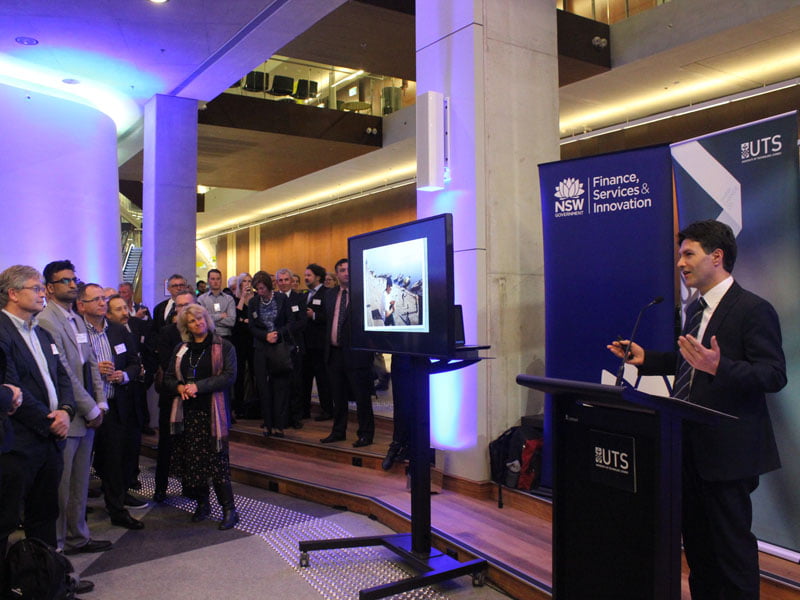NSW Innovation Minister Victor Dominello last week announced the development of a centralised Data Analytics Centre that is to become a centre of excellence for government data management and utilisation.
Listening to Mr Dominello, it was encouraging to hear from a Minister who is able communicate about the importance, values and necessity of innovation.
The inability of the overwhelming majority of our leaders to find their comfort zone in this dialogue on innovation is itself a major barrier to progress in this area. Whether this stems from a lack of understanding of the technology, or the process, or if it is simply an inability to find the right tone is really the same problem.

NSW is showing the most convincing leadership in this regard. It has a Premier who is comfortable putting forward complex ideas, and two young ministers in Mr Dominello and Finance Minister Dominic Perrottet who are driving smart innovation policy discussions.
The NSW Government’s Data Analytics Centre is a major initiative and is among the first of its kind in the public sector anywhere in the world. Its objective is quite clear: create an environment for innovative data analysis that will produce better information for decision-making.
Mr Dominella said this was not just about generating objective and insightful information to formulate good policy, but the producing the knowledge required to determine the optimum implementation plan for those policies.
At the same time that we are welcoming this unique data initiative – for better-informed decisions – we hear a daily cacophony of calls for ‘economic reform’, seen as the solution to almost every conceivable problem.
Typically what these people actually mean by the term ‘economic reform’ is a call for greater ‘productivity.’ As an innovation community, we need to reclaim this process, and introduce a new perspective on precisely what is meant by productivity.
The economist’s approach to productivity is to measure the ratio of inputs to achieve particular outputs, which is appropriate to label as input-based productivity. In the innovation realms, we apply new technologies and processes to achieve such input-based productivity, and this contributes to our economic and social well-being.
Equally, technology and innovation also allows us to deliver what we can call outcome-based innovation that is not just more of the same, but a transformation – a quantum leap – to a higher utility of activity across not only economic dimensions, but health and social as well.
Such transformations are not new, but they are rare and historically have been the result of a gradual process.
The Industrial Revolution is the prime example. New methods and technologies transformed not just our productivity, but our whole society, its values and its political organisations.
Agriculture advances moved from yielding subsistence crop levels to generating excesses on which trade could develop. Manufacturing developments moved most of us from the land into the cities.
It wasn’t just our economic standard of living that lifted. In 1750 life expectancy across France, England and the US ranged from 35 to 45-50 years. With the lift in productivity, our value system changed to abandon child and elderly labour as an accepted practice.
This technological revolution also led to the spread of democracy and subsequently universal suffrage across both class and gender.
Historians will also remind us that the Industrial Revolution itself emerged from the Age of Enlightenment, which developed over the 1620s-1780s by way of an extended clash of ideas led by the philosophers of the day but enabled by coffee houses and debating societies, embracing a broad set of views from all quarters and classes.
This interaction evolved into a search to discover the truth of ‘first principles’ across both political and scientific reason to set the frame of reference for the path to be followed.
In this context, I return to the topic of the new data analytics as a platform for the interchange of knowledge, technologies and capabilities to gain policy insight and program effectiveness. These are big ideas and big goals.
But I also want to challenge the NSW Government to add to its inputs the community practitioners, the psychologists and even the philosophers and historians to search for the potential outcome-based productivity and utility gains that might be achieved through technology and innovation.
The innovation community needs to expand its engagement in searching for, and articulating, such outcome-based productivity.
Like it or not, innovation is as much a social and even political event as it is a technology evolution. And we are right in the middle of one of the biggest social and economic transformations in our world’s history.
More on this next week.
Do you know more? Contact James Riley via Email.

